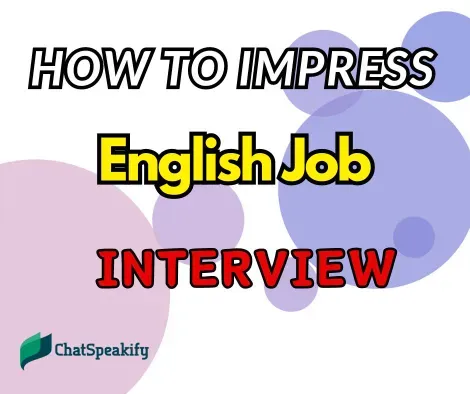It was a cool fall morning when I stood before a towering glass structure, my pulse racing. This was my first job interview in an English-speaking country, and I felt excitement and trepidation. Little did I know that the experience would teach me invaluable lessons and set the stage for countless future opportunities. If you’re preparing for an English job interview, here are some key tips to help you create a lasting impression.
Master the Basics: Research and Preparation
Preparation is your best friend for impressing at a job interview. Research the company’s culture, mission, products, and recent news extensively. Understanding the company’s values and goals allows you to tailor your responses to align with their vision.
Experience Tip: I once applied for a marketing role at a start-up. I demonstrated my research and proactive thinking by referencing a recent product launch and suggesting a marketing strategy based on their target demographic.
Enhance Your Language Skills
Proficiency in English is crucial. Brush up on industry-specific vocabulary and practice common interview questions and answers. Consider taking advanced English courses or working with a language coach to boost your skills.
Expert Tip: Use complex sentence patterns and associated jargon carefully to display your expertise without overloading the interviewer. For instance, instead of saying, “I am good at managing teams,” say, “I have a proven track record of leading cross-functional teams to consistently meet and exceed project milestones.”
Showcase Your Experience and Achievements
Illustrate your points with concrete examples from your past roles. Narrate stories that highlight your skills, such as problem-solving, leadership, and adaptability. Quantify your achievements wherever possible.
Example: “In my previous role as a project manager, I led a team of ten to complete a $5 million project two months ahead of schedule, resulting in a 15% increase in client satisfaction and a 10% reduction in costs.”
Display Confidence and Professionalism
Confidence is key. Maintain eye contact, offer a solid handshake, and sit upraight. Use positive body language to convey enthusiasm and readiness. Dress professionally and arrive early to demonstrate punctuality and respect.
Pro Tip: Practice mock interviews with friends or mentors to build confidence. Record yourself to identify areas for improvement, such as eliminating filler words or refining your answers.
Ask Insightful Questions
An interview is a two-way street. Prepare thoughtful questions to ask your interviewer about the company’s culture, team dynamics, and growth opportunities. This shows you are genuinely interested and have done your homework.
Sample Questions:
“Can you describe the team I would be working with?”
“What are the company’s goals for the next five years, and how does this role contribute to achieving them?”
Follow Up Professionally
Post-interview, send a personalized thank-you email to your interviewers. Express your appreciation for the opportunity and reiterate your enthusiasm for the role. Mention a specific topic from the interview to reinforce your interest and attention to detail.
Template: “Dear [Interviewer’s Name], thank you for the opportunity to discuss my potential role at [Company Name]. I am particularly excited about the innovative projects your team is working on and believe my skills in [specific area] would contribute significantly. I look forward to the possibility of working together. Best regards, [Your Name].”
Conclusion
Preparing for an English job interview can be daunting, but with the right strategies, you can turn it into a stepping stone for your career. By mastering the basics, honing your language skills, showcasing your achievements, displaying confidence, asking insightful questions, and following up professionally, you’ll leave a memorable impression on your prospective employers.
Remember, every interview is a learning experience. Embrace each challenge, refine your approach, and continue to grow. Your dream job is just an interview away.
References
Harvard Business Review: A reputable resource for interview techniques and career advice.
Forbes: Offers extensive articles on job preparation and professional development.
LinkedIn Learning: Provides courses on interview skills and business communication.
